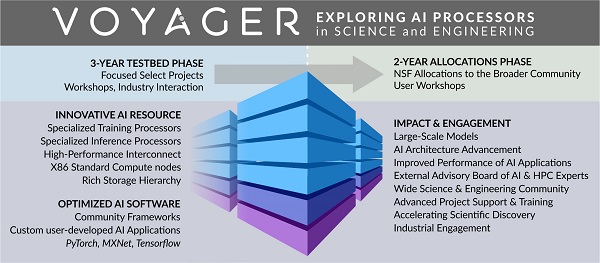
The San Diego Supercomputer Center has selected Habana Labs’ AI training and inference accelerators for SDSC’s Voyager supercomputer, scheduled to be in service this fall.
Habana said the HPC system, housed at the University of California, San Diego, will utilize Habana’s interconnectivity technology to scale AI training capacity with 336 Habana Gaudi training processors, which integrate 10 100-Gigabit Ethernet ports of RoCE RDMA v2 on chip, designed for scaling and bottlenecks avoidance. The Voyager system will also employ 16 Habana Goya inference processors to power AI infer
ence models. Voyager will be dedicated to advancing AI research across a range of science and engineering domains. The system build-out, as well as ongoing community support and operations, are funded by the National Science Foundation.
Last July, NSF announced it had awarded SDSC a $5 million grant to develop an HPC for AI-based scientific and engineering research. Server hardware maker Supermicro will deliver Habana-based AI systems for Voyager:
- Supermicro X12 Gaudi AI Training System (SYS-420GH-TNGR) with eight Gaudi HL-205 cards paired with dual-socket 3rd Gen Intel Xeon Scalable processors
- Supermicro SuperServer 4029GP-T featuring eight Goya HL-100 PCIe cards for AI inference, paired with dual-socket 2nd Gen Intel Xeon scalable processors.
The first three years of Voyager’s operation will be the Testbed Phase, during which SDSC will work with research teams from astronomy, climate sciences, chemistry, particle physics, and other fields. During this phase, SDSC said it will share experiences with the AI research computing community and documentation developed to serve as a resource for an expanded user base.
Habana said its training and inference chips “will provide data scientists and researchers with access to Voyager with flexibility to customize models with programmable Tensor Processor Cores and kernel libraries, and ease implementation with Habana’s SynapseAI Software platform, supporting popular machine learning frameworks and AI models for applications such as vision, natural language processing and recommendation systems.”
Acquired by Intel two years ago and operating as an independent unit in Intel’s Data Products Group, Habana Labs was founded in 2016 to develop processor platforms for training deep neural networks and for AI inferencing.
 “With innovative solutions optimized for deep learning operations and AI workloads, Habana accelerators are ideal choices to power Voyager’s forthcoming AI research,” said Amitava Majumdar, head of SDSC’s Data Enabled Scientific Computing division and principal investigator for the Voyager project. “We look forward to partnering with Habana, Intel and Supermicro to bring this uniquely efficient class of compute capabilities to the Voyager program, giving academic researchers access to one of the most capable AI-focused systems available today.”
“With innovative solutions optimized for deep learning operations and AI workloads, Habana accelerators are ideal choices to power Voyager’s forthcoming AI research,” said Amitava Majumdar, head of SDSC’s Data Enabled Scientific Computing division and principal investigator for the Voyager project. “We look forward to partnering with Habana, Intel and Supermicro to bring this uniquely efficient class of compute capabilities to the Voyager program, giving academic researchers access to one of the most capable AI-focused systems available today.”
“Combining Supermicro’s advanced application-optimized server and storage hardware with Habana’s AI training and inference products is precisely the best solution for SDSU’s multi-year Voyager AI project,” said Ray Pang, Vice President Technology and Business Enablement, Supermicro. “We continue to work closely with leading innovators to deliver solutions for computationally intensive projects worldwide at leading research and HPC environments for science and medical discovery, compute, and leading-edge AI solutions.”
“We are honored that Habana’s AI processors have been selected to power the AI workloads that will run on San Diego Super Computing’s Voyager supercomputer,” said Eitan Medina, Chief Business Officer at Habana. “This implementation of our Gaudi and Goya products showcases how top academic institutions like SDSC can harness efficiency and performance to effectively address the growing demands of AI research workloads.”
“The level of performance and efficiency that Voyager will require is precisely what Intel architectures are designed for,” said Trish Damkroger, vice president and general manager of Intel’s High Performance Computing group. “Our Xeon Scalable processors coupled with Habana AI accelerators will ensure Voyager’s users have the HPC and AI capabilities they need to power their game-changing research.”




